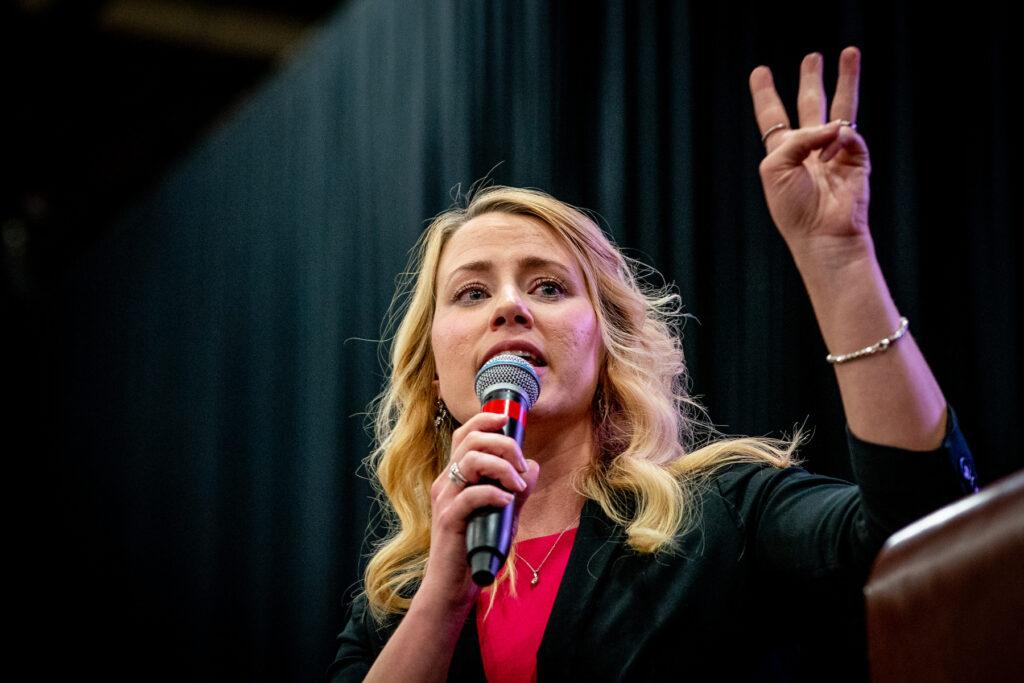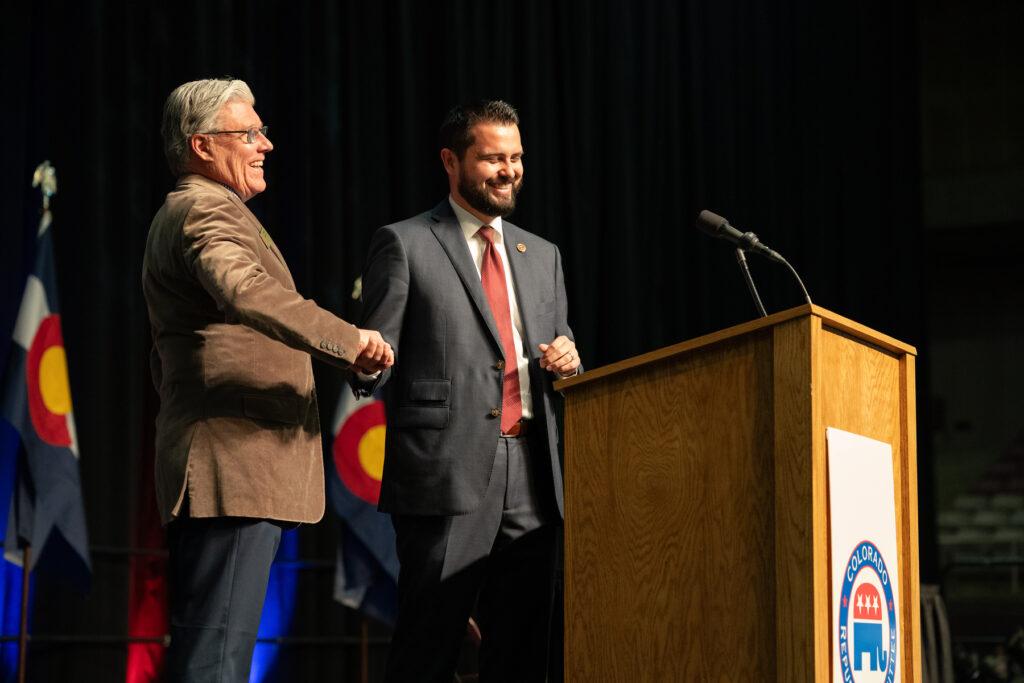
The Colorado Republican Party has a lot at stake in this year’s election. It’s trying to win a congressional seat it barely lost last time around, and could also have to defend another district it barely won. But the latest financial figures show the party’s fundraising could be in trouble going into the most crucial part of the year.
During this election cycle, which started in 2023, the Colorado Republican Party raised over $1 million dollars, while Colorado Democrats have raised over $2.5 million.
Digging into the GOP numbers, more than $250,000 of that total came from presidential candidates who had to pay the party to get on its primary ballot, while more that $255,000 came from former Speaker Kevin McCarthy’s joint fundraising committee to help frontline candidates.
Neither of those fundraising streams will continue.
Speaker Mike Johnson’s Grow the Majority joint fundraising committee dropped the state party last quarter, according to Greg Steele, Johnson’s political communications director. He did not respond to questions asking why Colorado’s party was taken off of the JFC.
The move came as a surprise to the Colorado GOP, which was still listed as a recipient in the JFC’s organization filing as of March 19.
“It’s perplexing why the JFC’s own treasurer hadn’t heard about your alleged report but if Speaker Johnson doesn’t want to back Colorado Republicans or our Pro-Trump movement, then we will win without him,” party Vice-Chair Hope Scheppelman told CPR News.
As of now two of Colorado’s congressional campaigns are included in Johnson’s JFC. It recently added state Rep. Gabe Evans, a Republican who is running in the state’s toss-up 8th district. And congresswoman Lauren Boebert made the list when she was running for reelection in the competitive 3rd Congressional District. Since then she’s moved to run in the state’s most Republican district — the 4th Congressional District. Both Evans and Boebert have been endorsed by Johnson.
Johnson has also endorsed Jeff Crank in the 5th district primary, putting him at odds with Colorado GOP chair Dave Williams, who’s also running for the seat.
While Colorado Republicans currently have a cash on hand advantage over Colorado Democrats, the state GOP hasn’t raised as much money from individuals.
In the April campaign finance filing, the state party brought in just over $45,000 from individual donors, for a total of $481,000 from individuals this cycle.
Scheppelman defended the party’s fundraising track record, pointing out that the party has had a surge in grassroots support that has “brought in over 2,000 new donors within the last quarter from patriots across this state” who trust party chair Williams to “lead the fight to take our country back from the fake-news leftists trying to divide us.”
Finger-pointing over finances
Current party leaders have laid some of the blame for the organization’s current financial situation on Williams’ predecessor in the job, former GOP chair Kristi Burton Brown, claiming she left the party without a lot of resources. In an email last year, the party said it was investigating “incidents of possible malfeasance and misappropriation of party resources.”
It’s an accusation Burton Brown has repeatedly pushed back against.
“(The Party’s) own reports to the Federal Election Commission demonstrate the number of the claims they made were false,” she told CPR News, pointing out the reports show she left the party with over $100,000 in the bank and no debt. “Those reports demonstrate that there was quite a bit of money left over at the end of my administration despite their claims to the contrary.”
It was Burton Brown who got the state included in the McCarthy JFC, with the goal of flipping the 8th Congressional District and defending Boebert in the third.
Still, Burton Brown offered Williams some grace.
“I think any chairman would have found it tough this year,” she said. “I think whenever a state starts leaning more to the other political party or people are more certain that it's leaning to the other political party, I think no matter who you are, it becomes hard to raise money and convince people that you can flip the seats.”

But how the party has been spending the money it does have has also been raising eyebrows among some Republicans.
Some point to Williams’ unusual payment structure as an example. Many recent past chairs have drawn salaries from the party as part of the payroll. Williams, who didn’t get paid when he first started, began receiving a consulting fee in December to his company Fox Group LTD. Payments have varied monthly from $4000 to $12,000.
Party insiders said so long as the executive committee agreed to it, there’s no issue with handling Williams’ compensation this way. Williams did not respond to a question asking why he chose to get paid through a consulting fee versus payroll.
Still, Kelly Maher, a Republican commentator and executive director of the newly-formed Restoring Standards PAC, recently filed a Federal Election Commission complaint against Williams, charging him with using the state party as a “slush fund.”
“Because of Dave Williams’ egregious actions, we really have to plant the flag as a party and say this is unacceptable,” she told CPR News. “He effectively has tried to turn the state Republican Party into a Super PAC for himself.”
Her concern is not the pay structure, but how the party has involved itself in the congressional primary where Williams is a candidate. At issue is a campaign flier the state party sent out in late February attacking Williams’ primary opponent, Jeff Crank.
“It was designed to lie about his opponent in the primary and it was aimed only into his congressional district,” Maher said. “And it was occurring at the time that he was going on the radio and TV announcing his candidacy saying that he was going to play it down the middle, and he was creating this from the state party to … attack his opponent.”
Williams, however, has defended his leadership of the party and the legitimacy of the flier, saying his critics are “never Trump, sell out Republicans who want to keep the status quo.”
“(The) Colorado Republican Party is laser-focused on securing conservative victories in 2024 and will not be distracted by disgruntled opponents like Jeff Crank who are attempting to divide our party and nation against itself in such a crucial election year,” said Colorado GOP Vice Chair Hope Scheppelman.
The FEC does have a number of special allowances for state parties, such as being able to contribute up to $5,000 to candidates, and there are no specific conflict-of-interest rules for candidates who are also party officers.
Shanna Potts, Senior Legal Counsel with the Campaign Legal Center also pointed out there’s a volunteer exemption that “lets state party committees distribute campaign materials so long as they use volunteers. And something that has been common with that is to distribute mail. It’s called party exempt mail.”
But the rules say a party can’t produce a mailer that favors one candidate in a primary. And even if the party uses the volunteer exemption, “it can only do so on behalf of someone who is assured of winning the nomination,” in other words only for a candidate running unopposed, which Williams is not.
Still, Maher’s complaint raises other questions for Potts, such as Williams having access to the state party’s email distribution list as chair, something campaigns would normally pay to access.
Potts said complaints take time to investigate and this one is unlikely to be resolved before November.
Party endorsements in contested primaries met with protest
Across the state, county-level GOP officials have raised complaints not just about how the party under Williams has handled his own congressional primary, but also those in the state’s two other Republican districts.
Earlier this month, the Yuma County Republican Executive Committee lambasted the state party for endorsing Rep. Boebert in the heavily contested 4th Congressional District primary, as well as for the party’s attacks on another Republican candidate in the race, Deborah Flora.
“The CRC (Colorado Republican Committee) should not be opposing or endorsing any candidate before the primary election. We encourage the Colorado Republican Party to restore the voice of the Republican voters and refrain from making decisions on their behalf,” the Yuma County GOP wrote on Facebook.
The party changed its bylaws late last year to allow it to endorse primary candidates who get on the ballot through the assembly process, and oppose those who rely on petitions.
In the 4th district, three candidates qualified through the assembly, although only Boebert got over 30 percent, while the other two followed a hybrid route — submitting petitions and securing support from more than 10 percent of the delegates.
When the party chose to endorse only Boebert, one of the other candidates, state Rep. Richard Holtorf, called on Williams to resign.
Holtorf, who is a member of the state central committee, said he didn’t vote for the resolution to end party neutrality. “Nowhere in the wording of this resolution does it state the Chair alone can endorse one individual candidate,” he wrote.

Taking sides in a primary is something no chair has done before, said former state party chair Dick Wadhams, a Williams critic.
“I describe it as unethical intervention in the primaries — in competitive primaries and especially his own, “ he said. “I mean, it is absolutely inappropriate and unethical for him to not resign (as) state chairman when he's involved in a competitive congressional district primary.”
The Huerfano County GOP has also called on Williams to resign, in part because he had law enforcement remove Sandra Fish, a political reporter with the Colorado Sun, from the state assembly earlier this month. The move got national attention and was condemned by numerous prominent Colorado Republicans.
But the county party also pointed to another reason for their call for Williams’ resignation. “We condemn the obvious and cynical rule making that nullified any votes cast in the decision to opt out of the Colorado primary system, other than those in the affirmative,” the letter stated.
The Colorado GOP has filed suit to stop unaffiliated voters from participating in either the Republican or Democratic primaries, something voters approved in 2016 through Propositions 107 and 108. It’s an issue the party has been fundraising for specifically, with the money going to now-disbarred lawyer John Eastman and the Claremont Institute to push the legal case.
It is an issue that has divided Republicans across the state, with one faction arguing only party members should have a say in who the party nominates are and another countering it would be foolish to shut out unaffiliated Coloradans, the largest bloc of voters in the state.
The party recently subpoenaed state Rep. Mike Lynch in connect with that lawsuit, as first reported by the Colorado Sun. Lynch also happens to be a primary candidate for the 4th district who has publicly sparred with Williams. Lynch has suggested the subpoena was meant to hurt him by implying he had to rely on unaffiliated voters to win a contested primary for his House seat in 2020.
In a fundraising email of his own, Lynch decried the situation, dismissing it as “a waste of resources that would be better spent boosting our historically low numbers in the state legislature.”
- ‘I don’t trust the state party anymore’: Colorado GOP leader Dave Williams under fire by party members over controversial tactics, personal attacks
- GOP Party Chair Dave Williams will run for retiring Rep. Lamborn’s seat. More contenders expected
- Colorado Republican leadership is set to meet as the party faces deep divisions and a hurting bottom line
- Colorado GOP Chair Dave Williams’ day job as a legislative aide raises some concerns at the Capitol







